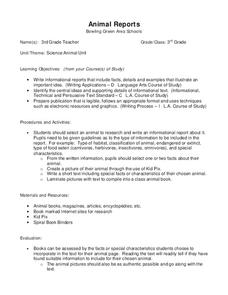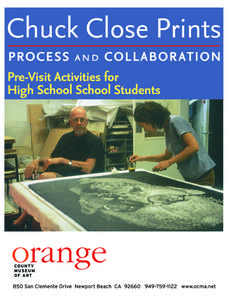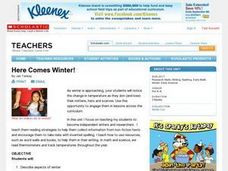Curated OER
Should We Hunt the Largest Animals on the Planet?
Students discover details about whaling. In this environmental stewardship lesson, students research selected websites to locate information about commercial whaling and its implications.
Curated OER
How Animals Meet Their Needs
Fourth graders research the Internet for facts relating to the animal of their choice. They use information from their Internet search to complete their animal project. TLW use his or her own words when writing their report.
Curated OER
Animals: Graphic Organizer
Second graders research information on the animal of their choice using the James E. Gerholt animal series books. They create a graphic organizer (concept web) using Kid Pix Deluxe 3 software, display information on screen, and create a...
Curated OER
Animal Reports
Third graders choose an animal to research and write a report about. They determine the animals' habitat, animal classification, whether it is endangered or extinct, and the type of food it eats. Also, they add any special...
Curated OER
Working Animals
Learners discuss the role of animals and how they can work with people to better the community. In this working animals lesson plan, students discuss how animals and people work together to complete different tasks in the community.
Curated OER
Orca Search: Step 5 Research Report
Students report their Orca research to the rest of the class choosing from a variety of formats. They touch on basic orca statistics, whales in captivity and their own opinions on this issue.
Curated OER
HyperStudio Stack on Native Michigan Animals
Fourth graders complete research about an animal which is native to Michigan using the Internet and other appropriate resources. They create a Hyperstudio stack report using the information for a presentation.
Curated OER
Folktales: The Wide World of Animals
Learners recognize and explain the roles of animals in folktales prior to retelling stories in their own words. Using teacher-provided Websites, they research animals and present their tales along with visuals. In related activities,...
NOAA
Please Pass the Salt
Salinity is the focus of two experimenters that work to answer the question, How does salt change the physical properties of water? Super scientists compare the freezing rate of salt and fresh water, combine the two waters to...
Wildlife Conservation Society
Build Your Wild Self
Get wild with an interactive web site that challenges scholars to create their wildest self. Future wild things begin as an average person—eyes, mouth, clothes—then morph into animal attributes—horns, tails, wings—and end in the...
Howard Hughes Medical Institute
The Great Elephant Census Modeling Activity
They say elephants never forget—and your class won't forget an insightful modeling activity either! Junior zoologists take part in a mock elephant census using the sample count and total count methods. The included materials provide...
Global Oneness Project
The Consciousness of Nature
Scholars voice their opinions about animal consciousness with an article that challenges common ideas about nature. After reading the article, learners engage in a thoughtful discussion before writing out their arguments...
A to Z Teacher Stuff
Polar Bear Crossword
Show what you know about polar bears with a 10-question crossword puzzle. Questions pertain to a polar bears' habitat, food source, and more!
A to Z Teacher Stuff
Word Search Match
Go beyond a traditional word search with a clue matching, word search combo. Scholars read clues, write the word that matches, then search for the word in a puzzle. Clues and words offer insight into the life of polar bears.
Dr. Seuss Enterprises
Read Across America
Celebrate the whimsical world of Dr. Seuss on Read Across America Day with a collection of science, technology, engineering, the arts, and mathematics activities, each linked to a popular Dr. Seuss story.
American Museum of Natural History
Drawing Dinos
Five steps walk budding artists through the process of drawing a dinosaur. A drawing guide showcases four dinosaurs—stegosaurus, tyrannosaurus rex, triceratops, and allosaurus.
Michigan State University
Friend or Foe?
What one person thinks is a pest may not be a pest to someone else. Here, scholars examine the characteristics of living things and pests through grand conversation and a variety of activities. Class members play a game of pest or not a...
PBS
Signal Senders
Send a signal to let others know one's location. Scholars investigate how scientists track the movement of marine wildlife. They model the process by creating a custom sound that can be used to identify each group member as they walk by.
Curated OER
Habitats of the World
Learners discover that the Earth supports many different animal habitats. In this habitat lesson students research different habitats of the world. Learners show how the animals in their habitat are adapted.
Curated OER
Flip Camera Lesson: Louisiana Animal Adaptations
Students research and present information about Louisiana animal adaptations. In this animal adaptation and video camera lesson, students choose an animal from a teacher prepared list. They use the Internet to find five adaptations which...
Curated OER
Creating a Food Web
Learners investigate hunters and prey by creating a food web. In this animal life lesson, students investigate a single organism in preparation for a field trip, discovering its diet and habitat. Learners each discuss their...
Curated OER
Here Comes Winter!
Learners investigate winter behaviors in animals. They describe winter and write about the characteristics of the season by drawing and labeling a winter picture. Students then conduct research on a chosen animal and create a chart. ...
Curated OER
Estuary Interviews
Young scholars role play as newscasters to highlight the lives of estuary animals. In this estuary animal lesson, students watch local new shows to examine how interviews take place. They research the lives of animals that live in...
Curated OER
Taming the Wild Aurochs
Sixth graders read and discuss the domestication of animals in history. In this Aurochs reading lesson, 6th graders define vocabulary and list similarities and differences between wild and domesticated animals. Students complete an...
Other popular searches
- Animals Research Projects
- Rain Forest Animals Research
- Rainforest Animals Research
- Abc Animals Research
- Music Animals Research























